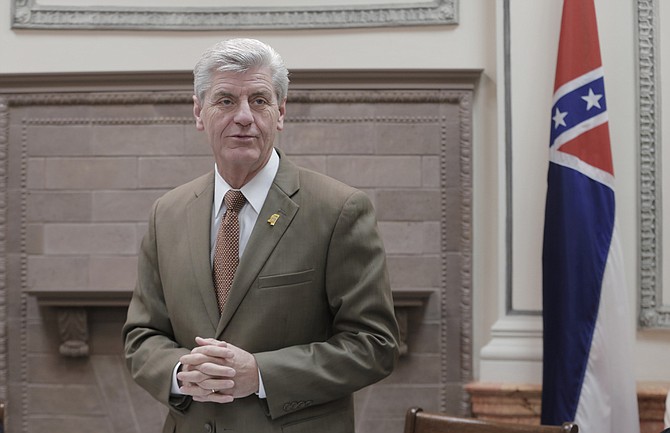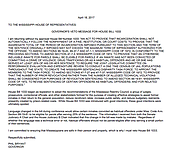More Mississippi inmates would soon be eligible for parole under a bill that both Republicans and Democrats passed to relieve the state's overcrowded criminal-justice system. But, Gov. Phil Bryant (pictured) vetoed it. Photo by Imani Khayyam.
JACKSON — Individuals would not be locked up for being financially unable to pay fines, and nonviolent offenders could get parole sooner under a bipartisan bill both the House and the Senate unanimously passed this session.
But, Gov. Phil Bryant vetoed it.
Bryant objected to the language allowing a person with three felony or federal crime convictions, called "habitual offenders" in state law, to be eligible for parole after serving 25 percent of their sentence—as long as they have not been convicted of a crime of violence or sex crime or other specific crimes that prohibit parole. The governor said the last-minute change "spoiled" the bill's good intentions.
In his statement, the governor said he received information from Senate Judiciary A Chairman Sen. Sean Tindell, R-Gulfport, and House Judiciary B Chairman Rep. Andy Gipson, R-Braxton, which "indicated that this change in the bill was made by mistake."
Tindell confirmed with the Jackson Free Press that the last-minute change was likely a result of a miscommunication that happened during conference weekend. He said the language of the bill should have excluded all "habitual offenders" from the 25-percent parole-eligibility role.
"Nonviolent habitual offenders would have been eligible for parole at 25 percent of their sentence, and that's a pretty far deviation from where things are now," Tindell told the Jackson Free Press. "And it wasn't quite clear how that got in there ... it was something that we tried to look at different ways of fixing, in particular maybe even a call for a special session, but there were certain drawbacks to that."
Tindell, a former district attorney, said he and governor agreed it is best to have a clean bill to pass next year. The mistake, if codified into law, would have made a lot for inmates eligible for parole faster, Tindell said.
"The fact that it (the parole eligibility requirement) was 25 percent on a habitual offender was just—in (the governor's) estimate and prosecutors and law enforcement officers' estimate—way too short."
Just because an inmate is eligible for parole does not mean he or she will be released from prison or jail. The state's parole board heard more than 10,000 cases in 2016 and paroled only 6,089 inmates. The governor indicated he does not favor parole eligibility for "habitual offenders" if they do not serve a significant chunk of their sentence.
"Regardless of whether this language was a technical error or not, habitual offenders should not be parole-eligible after only serving a small portion of their sentences," Bryant's veto message said. "I am committed to ensuring that Mississippians are safe in their person and property, which is why I must veto House Bill 1033."
Mississippi's "habitual offender" laws, often called "three-strikes laws," require judges to sentence a person to the maximum sentence for the third felony they have committed without eligibility for parole. This "three-strikes" rule applies to all felonies, including nonviolent ones. Blake Feldman, an advocacy coordinator at the ACLU of Mississippi, said these laws do nothing to keep Mississippi safe.
"When our prisons are overflowing in Mississippi, it doesn't help public safety—it sets up the Department of Corrections to fail," Feldman told the Jackson Free Press. "Public safety would be giving the Department of Corrections a reasonable population of people."
The number of inmates in the state is on the rise again this year. The state's inmate population has edged up past 19,000 inmates the most recent MDOC inmate population counts show. At the start of the year, 18,962 inmates were in MDOC's custody. Most recent counts show 19,153 inmates in the state.
Feldman said a bloated corrections system is not safe for prisoners on the inside, nor does it make sense for keeping the costs down, like re-entry and rehabilitation programs are designed to do.
"This veto is not driven by the economics or the data or the science. It's driven by a law enforcement community thinking that 'tough on crime' long sentences sounds better than evidence, (an) empirical reasoned approach," Feldman said.
The legislation had bipartisan support from the get-go, and the initial bill was the brainchild of the state's Reentry Council, made up of prosecutors, judges, lawmakers and other stakeholders around the state. The bill's advocates ranged from the left-leaning ACLU of Mississippi to the more conservative Mississippi Center for Public Policy.
Email state reporter Arielle Dreher at arielle@jacksonfreepress.com and follow her on Twitter at @arielle_amara. Read the JFP's award-winning "Preventing Violence" series at jfp.ms/preventingviolence.
More like this story
- Analysis: Push to Revise Parole Survives Despite Gov's Veto
- Mississippi Could Renew Debate on Revising Tight Parole Laws
- Vetoing Criminal Reforms Shortsighted, Dangerous
- Rukia Lumumba: Governor's Veto is 'Roadblock to Justice' for Incarcerated
- Parole Reform Passes to Governor’s Desk Amid Murky Future




Comments
Use the comment form below to begin a discussion about this content.